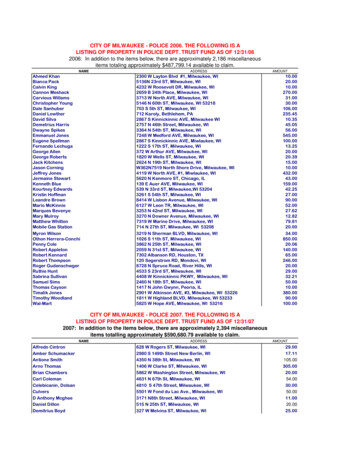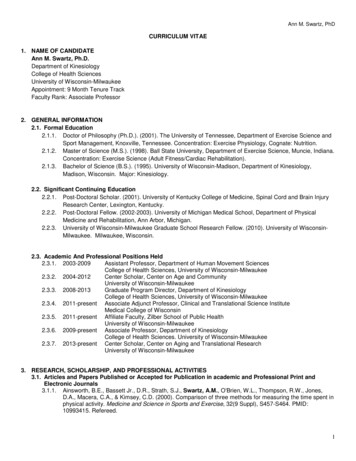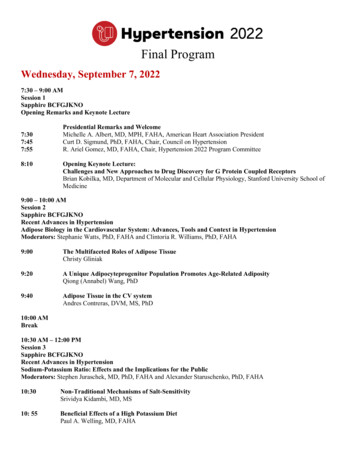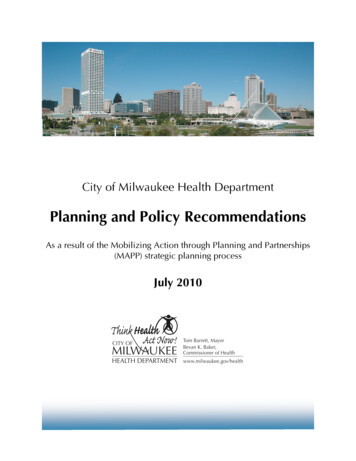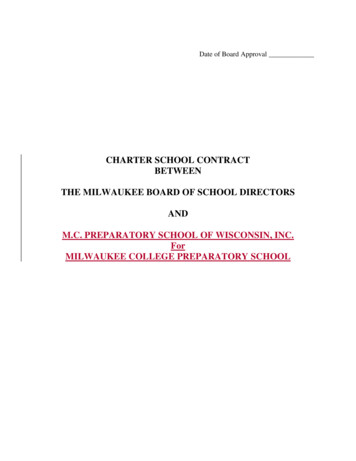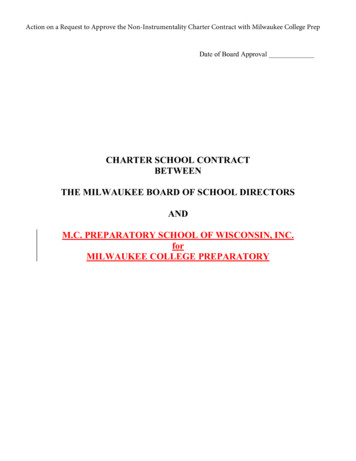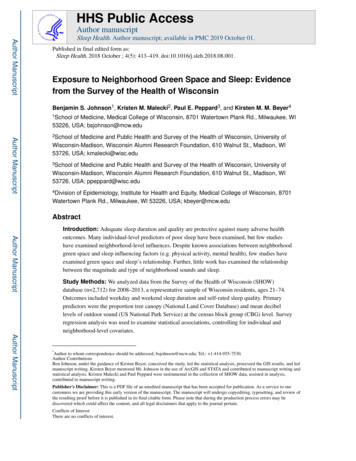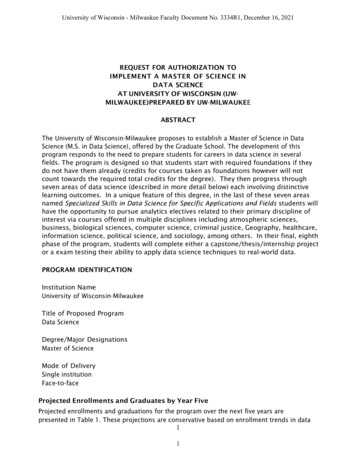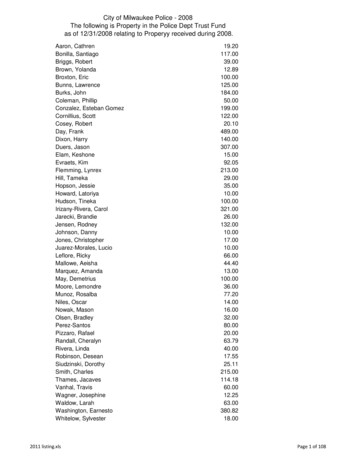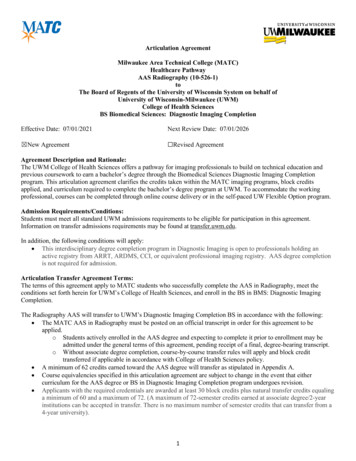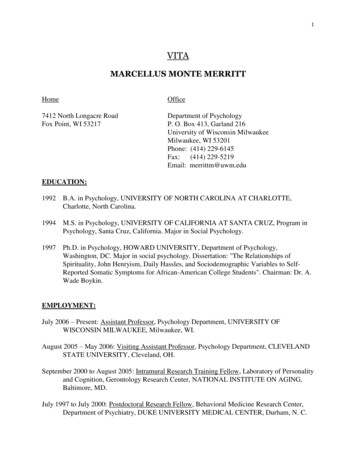
Transcription
1VITAMARCELLUS MONTE MERRITTHomeOffice7412 North Longacre RoadFox Point, WI 53217Department of PsychologyP. O. Box 413, Garland 216University of Wisconsin MilwaukeeMilwaukee, WI 53201Phone: (414) 229-6145Fax: (414) 229-5219Email: merrittm@uwm.eduEDUCATION:1992 B.A. in Psychology, UNIVERSITY OF NORTH CAROLINA AT CHARLOTTE,Charlotte, North Carolina.1994 M.S. in Psychology, UNIVERSITY OF CALIFORNIA AT SANTA CRUZ, Program inPsychology, Santa Cruz, California. Major in Social Psychology.1997 Ph.D. in Psychology, HOWARD UNIVERSITY, Department of Psychology,Washington, DC. Major in social psychology. Dissertation: "The Relationships ofSpirituality, John Henryism, Daily Hassles, and Sociodemographic Variables to SelfReported Somatic Symptoms for African-American College Students". Chairman: Dr. A.Wade Boykin.EMPLOYMENT:July 2006 – Present: Assistant Professor, Psychology Department, UNIVERSITY OFWISCONSIN MILWAUKEE, Milwaukee, WI.August 2005 – May 2006: Visiting Assistant Professor, Psychology Department, CLEVELANDSTATE UNIVERSITY, Cleveland, OH.September 2000 to August 2005: Intramural Research Training Fellow, Laboratory of Personalityand Cognition, Gerontology Research Center, NATIONAL INSTITUTE ON AGING,Baltimore, MD.July 1997 to July 2000: Postdoctoral Research Fellow, Behavioral Medicine Research Center,Department of Psychiatry, DUKE UNIVERSITY MEDICAL CENTER, Durham, N. C.
2May - June 1997: Assistant Professor, Psychology Department, HOWARD UNIVERSITY,Washington, D. C.December 1995 - May 1997: Project Administrator/Research Assistant, Office of EthnicMinority Affairs, AMERICAN PSYCHOLOGICAL ASSOCIATION, Washington, D. C.August 1995 - June 1997: Graduate Research Assistant, HOWARD UNIVERSITY, MinorityBiomedical Research Support program, Graduate School of Arts & Sciences,Washington, D. C.March - May 1994: Teaching Assistant, Department of Psychology, UNIVERSITY OFCALIFORNIA AT SANTA CRUZ, Santa Cruz, California.September - December 1993: Instructor, Kresge College, UNIVERSITY OF CALIFORNIA ATSANTA CRUZ, Santa Cruz, California.September - December 1993: Graduate Student Preceptor, Porter College Housing,UNIVERSITY OF CALIFORNIA AT SANTA CRUZ, Santa Cruz, California.May - August 1993: Research Internship, Bayview-Hunter's Point Foundation, TreatmentResearch Unit, UNIVERSITY OF CALIFORNIA AT SAN FRANCISCO, San Francisco,California.January - May 1992: Research Internship, UNIVERSITY OF NORTH CAROLINA ATCHARLOTTE, Community Relations Commission, Charlotte, North Carolina.
3HONORS AND AWARDS:2008- Center Scientist, Self-Management Science Center (SMSC), University Of WisconsinMilwaukee College of NursingNOTE. In October 2008, I was invited to become a member of the Center. As part of theCenter, I have to perform research and/or services related to self-management of medicalconditions.2008 Center on Aging and Community (CAC) Travel award (for poster presentation at the2008 Gerontological Society of America meeting). Title of presentation: John Henryismactive coping and diurnal salivary cortisol patterns among diverse female dementiafamily caregivers.2008 Scholar, Summer Institute Program to Increase Diversity (SIPID) National Heart , Lung,and Blood Institute (NHLBI) Grant Mentoring Program for Cardiovascular HealthDisparities: Brooklyn, New York. Title of proposal: Maximizing Diagnosis andTreatment for diverse Alzheimer’s/dementia Caregivers: Finding Relevant Behavioraland Psychophysiological Mechanisms.NOTE. In April 2008, I was invited by the NLHBI to become one of nine young scholarsin the Cardiovascular Health Disparities program. The main goal of the program is toprovide scholars with in-depth training and access to the NIH grant submission/reviewprocess and to cutting-edge research on cardiovascular health disparities. I attended thefirst part of the training program at SUNY-Brooklyn this past summer and will attend thesecond part next summer. Primary mentor Rhonda Montgomery, Ph.D. – University of Wisconsin Milwaukee,Applied Gerontology Program, Center on Age and Community,Director Secondary mentor Mark Sagar, M.D. –Wisconsin Alzheimer’s Institute, Director SIPID program mentor(s) Jason Lazar, M.D., SUNY-Brooklyn Downstate Medical Center,Cardiology program2008 Alternate, African-American Mental Health Research Scientist (AAMHRS) NIMH BStart Mentoring Program: Athens, Georgia. Title of proposal: Study of cardiovascularaging, psychosocial stress, and coping among diverse age-related disease caregivers inMilwaukee.2007 Center on Aging and Community (CAC) Travel award (for poster presentation at the2008 Society of Behavioral Medicine meeting). Title of presentation: John Henryism,active coping and diurnal salivary cortisol patterns among African- American andEuropean-American female dementia family caregivers.
42003 Recipient, Nathan Shock Postdoctoral Poster Award. National Institute on AgingIntramural Scientific Retreat: Baltimore, Maryland.2002 Clinical Science Fellows Representative, Gerontology Research Center, National Instituteon Aging, Intramural Research Program: Baltimore, Maryland.2001 Recipient, Nathan Shock Postdoctoral Poster Award. National Institute on AgingIntramural Scientific Retreat: Baltimore, Maryland.1995 Recipient, Trustee Scholarship, Howard University, Washington, D. C.1992 Recipient, three-year Minority Fellowship from the American Psychological Association,Washington, D. C.1992 Recipient, Graduate Opportunity Fellowship, University of California at Santa Cruz,Santa Cruz, California.1992 Recipient, Tuition Fellowship, University of California at Santa Cruz, Santa Cruz,California.1991 Chancellor's List, University of North Carolina at Charlotte, Charlotte, N.C.1991 Dean's List, University of North Carolina at Charlotte, Charlotte, N.C.1991 Psi Chi Honor Society, University of North Carolina at Charlotte, Charlotte, N.C.1991 Golden Key Honor Society, University of North Carolina at Charlotte, Charlotte, N.C.1986 Recipient, Omega Psi Phi Scholarship from Omega Psi Phi Fraternity, Shelby, N.C.PROFESSIONAL ASSOCIATION MEMBERSHIPS:Expert Reviewer, National Institute on Aging (NIA) program project (P01) grant submission.July 2008.Ad hoc reviewer for the professional journal: Journal of the National Medical Association, 2003to present.Ad hoc reviewer for the professional journal: Psychology and Aging, 2001 to present.Ad hoc reviewer for the professional journal: Annals of Behavioral Medicine, 2001 to present.Ad hoc reviewer for the professional journal: Psychosomatic Medicine, 2001 to present. (highimpact factor 4.60)Ad hoc reviewer for the professional journal: American College of Cardiology, 1999 to present.(high impact factor 3.10)
5Ad hoc reviewer for the professional journal: Journal of Behavioral Medicine, 2005.Ad hoc reviewer of applications for American Psychological Association Minority fellowships,2001 to present.Ad hoc reviewer for the professional journal: Health Psychology, 1999, 2002.Reviewer of abstracts for annual meetings of the Society of Behavioral Medicine and AmericanPsychosomatic Society, 2004 to present.American Psychosomatic Society (APS), Member, 1999 to present.Society of Behavioral Medicine (SBM), Member, 1996 to present.Gerontological Society of America (GSA), Member, 2007 to present.Midwestern Psychological Association (MPA), Member, 2007 to present.
6RESEARCH GRANTS:“TimeSlips: Impact on Physiological Outcomes in Persons with Alzheimer’s disease in NursingHomes.” Co-PIs: Thomas Fritsch, Anne Basting, Marcellus M. Merritt. American HealthAssistance Foundation grant application mechanism. Submitted 10/20/08. 400,000/3 years.NOTE. This research clinical trial will examine how nursing home patients withdementia respond to a 12-week storytelling intervention by measuring resting bloodpressure, daily salivary cortisol/DHEA and cognitive function across the protocol.“Psychosocial Factors in Stress Response study” with UWM students. PI: Marcellus M. Merritt.UWM Start-up funds. 2006-2009. 95,000.NOTE: We have run 25 (half African-American) participants through the protocol whichincludes: an online survey, two lab visits for cardiovascular reactivity measures, andfield measures of saliva on class and exam days for neuroendocrine function.“Reducing the Stigma of Depression in African Americans.” National Institute of Mental Health.PI: Jonathan Kanter, Role: Co-Investigator, 2007, (PAR-04-112). R01 application (PA-06-154).Submitted 2/5/07. (currently under second review).NOTE. This field-based study will include focus groups, surveys, and in-home interviewsto assess how African-Americans at risk for depression deal with stress in their lives andwhat types of interventions they perceive as effective. Project has helped me get entréeinto community health research networks.“Wavelet Transform and Pharmacodynamics Anyalysis of Atropine and Propanalol-InducedChanges in Human Heart Rate Variability.” National Institute on Aging. PI: Darrell R.Abernethy, Role: Co-Investigator, 2003-2005.NOTE. This experimental study tested variation in heart rate response topharmacological intervention and tilt table stress for diverse populations of adults.“Attentional and Affective Regulation in the Elderly.” National Institute on Aging (NIA)Intramural grant. PI: Julian F. Thayer, Role: Co-Investigator, 2000-2005.NOTE. This experimental study tested cardiovascular responses to mental and physicalstress among diverse populations of adults in national longitudinal studies aging andhealth.
7PUBLISHED ARTICLES:O’Connell-Edwards, C., Edwards, C.L., Pearce, M., Wachholtz, A.B., Wood., M.,Muhammad, M., Leach-Beale, B., Shelby, R., McDougald, C., Harrison, M.O., Feliu, M.,Edwards, L., Whitfield, K.E., Merritt, M., Wellington, C., Byrd, G., Edmonds, H., Robinson, E.(2009). Religious Coping and Pain Associated With Sickle Cell Disease: Exploration of a Nonlinear Model. Journal of African American Studies, 13, 1, 1-13.NOTE: Results from this study extend current research on the stress-buffering role ofreligiosity in pain among Sickle Cell Disease patients by showing how moderate levels ofreligiosity predict more lower pain reporting than extreme levels.Merritt, M. M., Bennett, G. G., Edwards, C. L., & Whitfield, K. E. (in press). Perceivedracism and cardiovascular reactivity and recovery to stress among Black men: Potentialpsychosocial mechanisms. Journal of Minority Issues and Economic Development: Special Issueon Men.NOTE: Results from this study were referenced in the July 15, 2007 Sunday edition of theBoston Globe newspaper (based in part on a phone interview with Dr. Merritt).Resultsfrom this study were cited in an article in the May 10, 2007 edition of the MedscapePsychiatry and Mental Health online journal.Sollers, J. J. III, Yonezawa, Y., Silver, R., Merritt, M., & Thayer, J. F. (in press). Anambulatory recording system for the assessment of heart-rate variability across multiple days.SPIE.Sollers, J. J. III, Merritt, M. M., Silver, R. A., Sadle, T. N., Ferrucci, L., & Thayer, J. F.(2006). Comparison of arterial compliance indices derived via beat-to-beat blood pressurewaveforms: aging and ethnicity. Biomedical Sciences Instrumentation, 42: 518-23.Merritt, M. M., Bennett, G. G., Williams, R. B., Edwards, C. L., & Sollers, J. J. III(2006). Perceived racism and cardiovascular reactivity and recovery to personally-relevant stress.Health Psychology, 25, 3: 364-9.Whitfield, K. E., Brandon, D. T., Robinson, E., Bennett, G., Merritt, M., & Edwards, C.(2006). Sources of variability in John Henryism. Journal of the National Medical Association,98, 4: 641-7.Sollers, J. J. III, Silver, R. A., Merritt, M. M., Evans, M. K., Zonderman, A. B., & Thayer,J. F. (2005). Understanding blood pressure variability: spectral indices as a function of genderand age. Biomedical Sciences Instrumentation, 41: 43-47.Bennett, G. G., Merritt, M. M., & Wolin, K. Y. (2004). Ethnicity, education, and thecortisol response to awakening: A preliminary investigation. Ethnicity and Health, 9, 4: 337-47.
8Bennett, G. G. Jr., Merritt, M. M., Sollers, J .J. III, Edwards, C. L., Whitfield, K. E.,Brandon, D. T., & Tucker, R. D. (2004). Stress, coping, and health outcomes among AfricanAmericans: A review of the John Henryism hypothesis. Psychology and Health, 19, 3: 369-83.Mager, D. E., Merritt, M. M., Kasturi, J., Witkin, L. R., Urdiqui-MacDonald, M., Sollers,J. J. III, Evans, M. K., Zonderman, A. B., Abernethy, D. R. & Thayer, J. F. (2004, March).Kullback-Leibler clustering of continuous wavelet transform measures of heart rate variability.Biomedical Sciences Instrumentation, 40: 337-342.Bennett, G. G. Jr., Merritt, M. M., Edwards, C. L., & Sollers, J. J. III. (2004, March).Perceived racism and affective responses to ambiguous interpersonal interactions among AfricanAmerican men. American Behavioral Scientist, 47, 7: 963-976.Merritt, M. M., Bennett, G. G. Jr., Williams, R. B., Sollers, J .J. III, & Thayer, J. F. (2004,January). Low educational attainment, John Henryism and cardiovascular reactivity and recoveryto personally-relevant stress. Psychosomatic Medicine, 66, 1: 49-55.Thayer, J. F., Merritt, M. M., Sollers, J .J. III, Zonderman, A. B., Evans, M. K., Yie, S., &Abernethy, D. R. (2003, December). Effect of angiotensin-converting enzyme insertion/deletionpolymorphism DD genotype on high-frequency heart rate variability in African-Americans.American Journal of Cardiology, 92: 1487-1490.Terracciano, A., Merritt, M. M., Zonderman, A. B., & Evans, M. K. (2003, December).Personality traits and sex differences in emotion recognition among African-Americans andCaucasians. Annals of the New York Academy of Sciences, 1000: 309-312.Merritt, M. M., Sollers, J. J. III, Evans, M. K., Zonderman, A. B. & Thayer, J. F. (2003,April). Relationships among spectral measures of baroreflex sensitivity and indices of cardiacvagal control. Biomedical Sciences Instrumentation, 39: 193-198.Sollers, J. J. III, Ahern, G. L., Merritt, M. M., & Thayer, J. F. (2002, April). Timefrequency analysis of the cardiovascular response during the intracarotid amobarbital test.Biomedical Sciences Instrumentation, 38: 267-271.Harrell, J. P., Merritt, M. M., & Kalu, J. (1998). Racism, stress and disease. AfricanAmerican Mental Health. In R. Jones, (Ed.), (pp. 247-280). Cobb & Henry: Hampton, VA.Merritt, M. M. (1997). Training Capacity Grants for the recruitment, retention, andtraining of psychologists of color at Historically Black Colleges and Universities. Communique:Public Interest Directorate, Office of Ethnic Minority Affairs, American PsychologicalAssociation. February, 44-47.Merritt, M. M. (1996). APA launches Training Capacity Grants for the recruitment,retention, and training of psychologists of color in Historically Black Colleges and Universities.Communique: Public Interest Directorate, Office of Ethnic Minority Affairs, AmericanPsychological Association. February, 13-14.
9Merritt, M. M. (1996). APA awards Training Capacity Grants to three departments ofpsychology at Historically Black Colleges and Universities. Communique: Public InterestDirectorate, Office of Ethnic Minority Affairs, American Psychological Association. July, 25-26.
10PEER REVIEWED PUBLISHED ABSTRACTS:Merritt, M. M., Edwards, C. L., Bennett, G. G., Koenig, H. G., & Abdullah, M. (2008,March). A non-linear role of religiosity in cardiovascular reactivity to personally-relevant stress?:The moderating role of educational attainment. Annals of Behavioral Medicine, 35 (2008Supplement): p. S127.Merritt, M. M., McCallum, T. J., & Fritsch, T. (2008, March). John Henryism, activecoping and diurnal salivary cortisol patterns among African- American and European-Americanfemale dementia family caregivers. Annals of Behavioral Medicine, 35 (2008 Supplement- RapidCommunication): p. 68-69.Edwards, C.L., Johnson, S., Bennett, G.G., Wood, M., DeCastro, L., Feliu, M., Harrison,M.O., Robinson, E., Merritt, M., & Whitfield, K. (April, 2005). High effort coping (JH), chronicpain and morbidity in patients with sickle cell disease (SCD). Annals of Behavioral Medicine, 29(2005 Supplement): p. S26.Merritt, M. M., Bennett, G. G. Jr., Sollers, J .J. III, Thayer, J. F., & Edwards, C. L. (2005,April). John Henryism and cardiovascular risk: Potential behavioral and psychosocialmechanisms. Annals of Behavioral Medicine, 29 (2005 Supplement): p. S141.Merritt, M. M., Sollers, J .J. III, Evans, M. K., Zonderman, A. B., Abernethy, D. R. &Thayer, J. F. (2005, March). Endothelial nitric oxide synthase and angiotension convertingenzyme I/D polymorphisms genotypes and resting heart rate variability among AfricanAmericans. Psychosomatic Medicine, 2005 Supplement.Merritt, M. M., Sollers, J .J. III, Evans, M. K., Zonderman, A. B., & Thayer, J. F. (2005,March). Hypertension and reduced autonomic response to affective stimuli among AfricanAmerican adults. Psychosomatic Medicine, 2005 Supplement.Anokhin, A., Sollers, J .J. III, Silver, R., Merritt, M. M., & Thayer, J. F. (2005, March).Heritability of heart rate variability in young women. Psychosomatic Medicine, 2005Supplement.Merritt, M. M., Jonassaint, C., Sollers, J .J. III, Evans, M. K., Zonderman, A. B., &Thayer, J. F. (2005, March). An interaction between Neuroticism and Agreeableness predictsvascular responses to affective stimuli among African-American adults. PsychosomaticMedicine, 2005 Supplement.Merritt, M. M., Sollers, J .J. III, Evans, M. K., Zonderman, A. B., Abernethy, D. R. &Thayer, J. F. (2004, October). Endothelial nitric oxide synthase genotypes and total peripheralresistance at recovery from perception of affect among African Americans: Gender differences.Psychophysiology, 41 (Supplement 1): p. S94.Merritt, M. M., Sollers, J .J. III, Evans, M. K., Zonderman, A., & Thayer, J. F. (2004,June). Ethnic differences in cardiovascular response to emotional stimuli. Ethnicity and Disease,14, 4 (2004 Supplement): p. S2-53.
11Sollers, J .J. III, Merritt, M. M., Evans, M. K., Zonderman, A., Abernethy, D. R., &Thayer, J. F. (2004, April). Depressive symptomology and heart rate variability in AfricanAmericans: Gender differences. Psychosomatic Medicine, 66 (2004 Supplement): p. 50.DeBlasio, K. L., Silver, R. A., Merritt, M. M., Sollers, J. J. III, & Thayer, J. F. (2004,March). Cardiovascular reactivity to perception of affect among older adults. Annals ofBehavioral Medicine, 27 (2004 Supplement): p. S72.Merritt, M. M., Sollers, J .J. III, Evans, M. K., Zonderman, A. B. & Thayer, J. F. (2003,October). Depression and autonomic and vascular responses to affective stimuli among olderAfrican-American adults. Psychophysiology, 40 (Supplement 1): p. S59.Merritt, M. M., Bennett, G. G. Jr., Williams, R. B., Sollers, J .J. III, & Thayer, J. F. (2003,March). Low educational attainment, John Henryism and cardiovascular reactivity and recoveryto personally-relevant stress. Annals of Behavioral Medicine, 25 (2003 Supplement): p. S30.Yie, S., Merritt, M., Sollers, J ., Nie, Z., Zonderman, A., Evans, M., Abernethy, D., &Thayer, J. (2003, October). Effect of angiotensin-converting enzyme I/D polymorphisms on heartrate variability in a community based African-American sample. Gerontologist, 42 (1): p. 132.Bennett, G. G. Jr., Merritt, M. M., Edwards, C. L., & Williams, R. B. (2002, April).Ethnicity moderates the relation between depression and cortisol secretion. Annals of BehavioralMedicine, 24 (2002 Supplement): p. S104.Tsai, J. L., Roberts, N., Brown, L., Merritt, M., & Harrell, J. (2002). What haspsychophysiology revealed about ethnicity and emotion? Psychophysiology, 39 (Supplement 1):p. S8.Merritt, M. M., Abernethy, D. R., Evans, M. K. Sollers, J .J. III, Zonderman, A. B. &Thayer, J. F. (2002, October). Cardiovascular reactivity to perception of affect among olderAfrican-American adults. Psychophysiology, 40 (Supplement 1): p. S59-S60.Bennett, G. G. Jr., Merritt, M. M., Edwards, C. L., & Williams, R. B. (2002, April).Ethnicity moderates the relation between depression and cortisol secretion. Annals of BehavioralMedicine, 24 (2002 Supplement): p. S104.Merritt, M. M., Abernethy, D. R., Evans, M. K. Sollers, J .J. III, Zonderman, A. B. &Thayer, J. F. (2002, April). Autonomic and vascular responses to affective stimuli among olderAfrican-American adults. Annals of Behavioral Medicine, 24 (2002 Supplement): p. S103.Merritt, M. M., Bennett, G. G. Jr., & Williams, R. B. (2002, April). Subtle racism andelevated cardiovascular reactivity among Black males. Annals of Behavioral Medicine, 24 (2002Supplement): p. S18.Murphy, R. A., Bennett, G. G. Jr., Merritt, M. M., Noll, A. R., Merritt, M. M. (2002,April). Hostility in African-American adults may be related to low socioeconomic status in earlylife. Annals of Behavioral Medicine, 24 (2002 Supplement): p. S75.
12Merritt, M. M., Abernethy, D. R., Evans, M. K. Sollers, J .J. III, Zonderman, A. B. &Thayer, J. F. (2001, November). The effect of emotionally salient sentences and faces on thecardiovascular responses of a community-based African-American sample. Psychophysiology, 38(Supplement 1): p. S66.Merritt, M. M., Bennett, G. G. Jr., & Williams, R. B. (2001, January). Low hostility andhigh state negative affect are linked with elevated blood pressure responses to mental stress inBlack males. Psychosomatic Medicine, 63 (1): p. 117.Killough, A. L., Edwards, C. L., Drewes, D., Bennett, G., & Merritt, M. (2000, November).Psycho-socio-behavioral systems models: Measures that reflect cultural differences.International Journal of Behavioral Medicine, 21, (Supplement). 1, pg. 113.Bennett, G. G. Jr., Merritt, M. M., Edwards, C. L., & Killough, A. (2000, January).Hostility buffers cortisol responses to stress in African-American males with low social support.Annals of Behavioral Medicine, 22 (Supplement): p. 7.Bennett, G. G. Jr., Merritt, M. M., & Williams, R. B. (2000, January). The effects of JohnHenryism and job control on cortisol responses to stress. Annals of Behavioral Medicine, 22(Supplement): p. 7. Abstract accepted for press release.Merritt, M. M., Bennett, G. G. Jr., & Williams, R. B. (2000, January). John Henryism,low educational attainment, and cardiovascular reactivity to stress. Annals of BehavioralMedicine, 22 (Supplement): p. 141.Merritt, M. M., Bennett, G. G. Jr., & Williams, R. B. (2000, January). Religiosityenhances cardiovascular reactivity among Black males with low education. PsychosomaticMedicine, 62 (1): p. 139.Merritt, M. M., Bennett, G. G. Jr., & Williams, R. B. (2000, January). Subtle racismenhances cardiovascular reactivity to stress among Black males with low education. Annals ofBehavioral Medicine, 22 (Supplement): p. 141.Murphy, R. A., Bennett, G. G. Jr., Merritt, M. M., & Williams, R. B. (2000, January).Dissonance between childhood and adult socioeconomic status alters cortisol responsivity tostress. Annals of Behavioral Medicine, 22 (Supplement): p. 142.Brummet, B. H., Lane, J. D., Merritt, M., Sheaks, J., Siegler, I. C., & Barefoot, J. C.(1999, January). Cardiovascular reactivity is associated with induced anger and depressive affect.Psychosomatic Medicine, 61 (1): p. 115.Merritt, M. M. & Harrell, J. P. (1998, January). The relationships of somatic symptomswith coping strategies, life satisfaction, and daily hassles. Psychosomatic Medicine, 60 (1): p.114.
13PAPERS IN PREPARATION:Merritt, M. M., McCallum, T. J., & Fritsch, T. John Henryism active coping positivelypredicts dysregulated diurnal salivary cortisol patterns among African American female dementiafamily caregivers. Paper submitted to the Journals of Gerontology: Psychological and SocialSciences.Merritt, M. M., Bennett, G. G., Edwards, C. L., Koenig, H. G., Whitfield, K. E.,McDougald, C., Kulland, A. M., & Abdullah, M. For Church and Money: Impact of religiosityand socioeconomic status on cardiovascular autonomic control in African American Men. Papersubmitted to the Annals of Behavioral Medicine.Merritt, M. M., Bennett, G. G. & Thayer, J. F. Affect in cardiovascular reactivity as afunction of sympathetic functioning in African Americans. In The Handbook and BehavioralMedicine and Diversity: Understanding Issues of Disease in Diverse Populations. C. L.Edwards, Editor.Cacioppo, J. T., Merritt, M. M., Evans, M. K., Sollers, J .J. III, Zonderman, A. B.,Thayer, J. F., & Anderson, N. B. Loneliness, perception of affect (PAT), and elevated vascularresistance in a community-based African-American sample.Merritt, M. M., Sollers, J .J. III, Evans, M. K., Zonderman, A. B., Abernethy, D. R.,Thayer, J. F. & Anderson, N. B. Endothelial nitric oxide synthase genotypes and total peripheralresistance at recovery from perception of affect among African Americans: Gender differences.Merritt, M. M., Sollers, J .J. III, Evans, M. K., Zonderman, A. B., Thayer, J. F., &Anderson, N. B. Ethnic differences in cardiovascular response and recovery to perception ofaffect.Merritt, M. M., Evans, M. K., Sollers, J .J. III, Zonderman, A. B., Thayer, J. F.,McCubbin, J. & Anderson, N. B. Elevated cardiovascular responses at baseline predict reducedemotion recognition in a community-based African-American sample.Bennett, G. G. Jr., Merritt, M. M., Edwards, C. L., Sollers, J. J. III & Williams, R. B.Biological alterations associated with occupational stress: I. High effort coping, job demands,and the cortisol response to awakening.Jackson, B., Bennett, G. G. Jr., Merritt, M. M. & Edwards, C. L. The role ofexperimenter race effects in behavioral medicine outcomes.Merritt, M. M. & Harrell, J. P. The stress-buffering and stress-enhancing roles of racialidentity, spirituality, John Henryism, and academic adjustment among Black college students.Killough, A., Edwards, C. L., Merritt, M. M., Bennett, G. G. Jr., & Drewes, D. Biopsycho-socio-behavioral structures: Cultural antecedents to essential hypertension in AfricanAmerican males.
14PROFESSIONAL PRESENTATIONS:Merritt, M. M., McCallum, T. J., & Fritsch, T. (March, 2009). How Much Striving is tooMuch? John Henryism Active Coping Predicts Worse Diurnal Salivary Cortisol Patterns forBurdened African-American Female Dementia Family Caregivers. Poster accepted forpresentation at the annual meeting of the American Psychosomatic Society: Chicago, IL.Merritt, M. M., Bennett, G. G., Edwards, C. L., Koenig, H. G., Whitfield, K. E.,McDougald, C., Kulland, A. M., & Abdullah, M. (March, 2009). For Church and Money: Impactof Religiosity and Socioeconomic Status on Cardiovascular Responses in African AmericanMen. Poster accepted for presentation at the annual meeting of the American PsychosomaticSociety: Chicago, IL.Killough, A. L., Edwards, C. L., Russell, W., Robinson, E., Merritt, M., et al. (November,2008). Does Culture Matter - Structural Systems Framework Using Underlying ConstructAnalysis to Conceptualize and Evaluate Approaches to Risk Reduction and HIV PreventionIntervention among Minorities. Health Equality: Honoring Culture While Closing the Gap. 2008OMMH National Health Disparities Conference, Prior Lake, MN.Merritt, M. M., McCallum, T. J., & Fritsch, T. (2008, November). John Henryism activecoping and diurnal salivary cortisol patterns among diverse female dementia family caregivers.Poster presented at the 2008 meeting of the Gerontological Society of America: National Harbor,MD. (see CAC Travel award above)Edwards, C. L., Pells, J., Merritt, M., Robinson, E., Johnson, S., Bennett, G. G., James, S.A., DeCasto, L., & Whitfield, K. (2008, September). The effects of John Henryism (JH) onweight and functionality in African Americans with Sickle Cell Disease (SCD). Paper presentedat the 2008 annual meeting of the Sickle Cell Disease Association of America (SCDAA): NewOrleans, LA.Wellington, C., Edwards C. L., Feliu, M., Wood, M., McDougald, C., Whitfield, K.,Decastro, L., Byrd, G., Robinson, E., Harrison, M. O., Pells, J., Leach-Beale, B., Mathis, M.,Merritt, M., Whitworth, E., Abrams, M., Edwards, L., Pritchette, P., O'Garo, K., Jonassaint, J.,McNeil, J., Cobb, A., Logue, P., Raynor, R. D. (August, 2008). Psychosocial contributors toSickle Cell Disease (SCD): A Genetic Disorder. Poster presented at Southeastern RegionalGenetics Group (SERGG): Charleston, SC.Abdullah, M., Merritt, M. M. (2008, May). Religiosity predicts reduced cardiovascularand neuroendrocrine reactivity to personally-relevant stress: Yet only at high education levels.Poster presented at the 2008 meeting of the Midwestern Psychological Association: Chicago, IL.Merritt, M. M. (2008, May). John Henryism active coping, educational attainment, andcardiovascular and neuroendrocrine reactivity to personally-relevant stress: The unusual role ofhostility. Poster presented at the 2008 meeting of the Midwestern Psychological Association:Chicago, IL.Merritt, M. M., Edwards, C. L., Bennett, G. G., Koenig, H. G., & Abdullah, M. (2008,March). A non-linear role of religiosity in cardiovascular reactivity to personally-relevant stress?:
15The moderating role of educational attainment. Poster presented at the 2008 meeting of theSociety of Behavioral Medicine: San Diego, CA.Merritt, M. M., McCallum, T. J., & Fritsch, T. (2008, March). John Henryism, activecoping and diurnal salivary cortisol patterns among African- American and European-Americanfemale dementia family caregivers. Poster presented at the 2008 meeting of the Society ofBehavioral Medicine: San Diego, CA. (see CAC Travel award above)Merritt, M. M. (2007, March). Continuing the path: Racism stress and psychophysiologicresponses as indicators of long-term risk. Paper presented at the annual meeting of the Society ofBehavioral Medicine: Washington, DC. (Invited)Abdullah, M., Merritt, M. M. (2007, July). Religiosity, anger coping and cortisol outputto personally-relevant stress. Paper presented at the annual UWM Ronald McNair Scholarsprogram summit: Milwaukee, WI.James, S. A., Whitfield, K. E., Jonassaint, C.R., Merritt, M.M., Edwards, C.L., &Robinson, E. (2006, March). John Henryism and health outcomes am
Biomedical Research Support program, Graduate School of Arts & Sciences, Washington, D. C. March - May 1994: Teaching Assistant, Department of Psychology, UNIVERSITY OF CALIFORNIA AT SANTA CRUZ, Santa Cruz, California. September - December 1993: Instructor, Kresge College, UNIVERSITY OF CALIFORNIA AT SANTA CRUZ, Santa Cruz, California.
